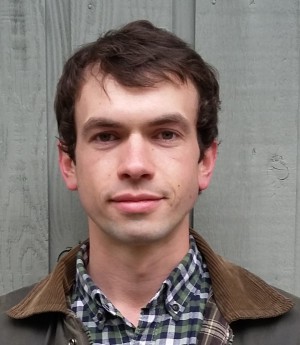2021 Sanford Gold Medal in Divinity: Timothy Wisnicki
 Few would expect a U of T undergraduate student with a B.Sc. in immunology to pursue a master’s degree in theology, but Timothy Wisnicki Emm 2T1 is not your typical theologian. Exceptionally hard working and talented, Wisnicki is this year’s recipient of the Sanford Gold Medal in Divinity, an award given on the completion of the Master of Divinity program, and on the basis of a candidate’s outstanding scholarship, ability and character. As a man of both faith and science, he is uniquely positioned to help tackle a post-pandemic future where larger questions are inevitable.
Few would expect a U of T undergraduate student with a B.Sc. in immunology to pursue a master’s degree in theology, but Timothy Wisnicki Emm 2T1 is not your typical theologian. Exceptionally hard working and talented, Wisnicki is this year’s recipient of the Sanford Gold Medal in Divinity, an award given on the completion of the Master of Divinity program, and on the basis of a candidate’s outstanding scholarship, ability and character. As a man of both faith and science, he is uniquely positioned to help tackle a post-pandemic future where larger questions are inevitable.
“When the whole pandemic hit, I wondered if I was supposed to be in a lab somewhere,” Wisnicki says. “But there is one of those token C.S. Lewis quotes that says, ‘Christianity, if false, is of no importance, and if true, of infinite importance, the only thing it cannot be is moderately important.’
“In that sense, when you approach questions of faith and God, you are dealing with things of ultimate concern. The importance of theological questions struck a chord with me, and I knew I wouldn’t be satisfied not pursuing theology academically.”
Wisnicki says despite his background in science, the decision to pursue studies in theology at Emmanuel College came relatively easily.
“I grew up with the United Church and always maintained a fondness for it,” he says. “Emmanuel is the obvious choice because of its great faculty and because it is federated with the Toronto School of Theology. There was an opportunity for a lot of interesting cross-talk and to take courses from other denominational colleges and all that appealed to me very much.”
Wisnicki says that another major reason for choosing Emmanuel was because of his family legacy. His grandfather, a United Church minister, was an Emmanuel alumnus, and his mother was a Vic alumna.
“It brings great joy to me to walk through the hallways and see my grandfather’s picture on the wall. In a way it felt like home before I ever got here,” he says.
At Emmanuel, Wisnicki says he was drawn in by all his courses, especially those exploring systematic theology and biblical studies. In particular, he says he connected with Prof. William S. Kervin and Prof. Judith H. Newman.
“Probably more than anyone, Prof. Kervin has the position to shape the way people do church services at the United Church because he teaches people basic things about prayers and orders of services. He is wonderful. He’s a musician like me, and a lovely, great mind,” Wisnicki says.
“I also connected with Prof. Newman, who is the Old Testament professor. She is a great scholar. Her writing is excellent. She is well known in biblical studies circles, and helped me to see the Old Testament as this wonderful world that we don’t hear about as much because we tend to focus on the New Testament in mainline Christianity. She made the classes fun.”
With his studies now complete, Wisnicki once again finds himself at a crossroads.
“The future is a bit uncertain, but the plan is still to pursue ordination in the United Church,” he says. “I’ll probably end up working, preaching and ministering in a congregation some time in the next year or so, but I haven’t ruled out coming back for graduate studies. If I do graduate studies I will likely do biblical studies focusing on the New Testament, which is an area of interest for me.”
Regardless of the direction he chooses, Wisnicki still hopes to have a voice in his community.
“I’d like to think that at a grassroots level I’ll be dealing with everyday situations in the religious community, and be able to guide the discussion and conversations in the people I meet,” he says.
“I think having a background in both science and faith might actually lend me some credibility in what I might write or preach about in the future, post-pandemic. Simply for people to know that there are people who don’t see the scientific method as in conflict with knowledge that comes from faith is important.
“I don’t know what the discourse will sound like in the future, but I think it will be increasingly necessary for people to ask big questions with a basic knowledge of science as well as theology and faith. We just don’t know what those questions are yet.”
